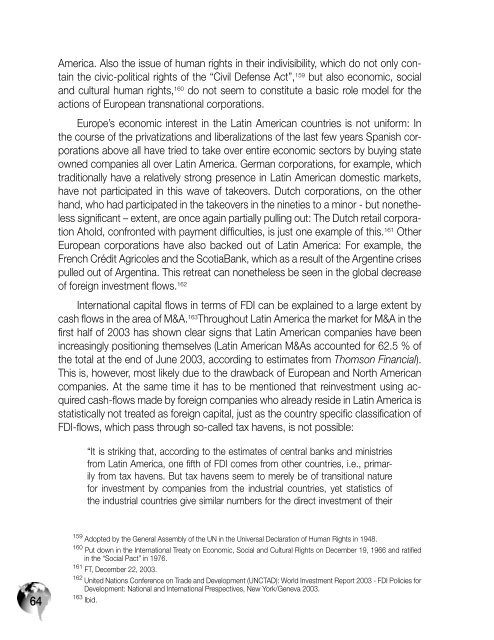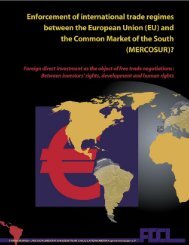(EU) and the Common Market of the South (MERCOSUR)? - FDCL
(EU) and the Common Market of the South (MERCOSUR)? - FDCL
(EU) and the Common Market of the South (MERCOSUR)? - FDCL
Create successful ePaper yourself
Turn your PDF publications into a flip-book with our unique Google optimized e-Paper software.
64<br />
America. Also <strong>the</strong> issue <strong>of</strong> human rights in <strong>the</strong>ir indivisibility, which do not only contain<br />
<strong>the</strong> civic-political rights <strong>of</strong> <strong>the</strong> “Civil Defense Act”, 159 but also economic, social<br />
<strong>and</strong> cultural human rights, 160 do not seem to constitute a basic role model for <strong>the</strong><br />
actions <strong>of</strong> European transnational corporations.<br />
Europe’s economic interest in <strong>the</strong> Latin American countries is not uniform: In<br />
<strong>the</strong> course <strong>of</strong> <strong>the</strong> privatizations <strong>and</strong> liberalizations <strong>of</strong> <strong>the</strong> last few years Spanish corporations<br />
above all have tried to take over entire economic sectors by buying state<br />
owned companies all over Latin America. German corporations, for example, which<br />
traditionally have a relatively strong presence in Latin American domestic markets,<br />
have not participated in this wave <strong>of</strong> takeovers. Dutch corporations, on <strong>the</strong> o<strong>the</strong>r<br />
h<strong>and</strong>, who had participated in <strong>the</strong> takeovers in <strong>the</strong> nineties to a minor - but none<strong>the</strong>less<br />
significant – extent, are once again partially pulling out: The Dutch retail corporation<br />
Ahold, confronted with payment difficulties, is just one example <strong>of</strong> this. 161 O<strong>the</strong>r<br />
European corporations have also backed out <strong>of</strong> Latin America: For example, <strong>the</strong><br />
French Crédit Agricoles <strong>and</strong> <strong>the</strong> ScotiaBank, which as a result <strong>of</strong> <strong>the</strong> Argentine crises<br />
pulled out <strong>of</strong> Argentina. This retreat can none<strong>the</strong>less be seen in <strong>the</strong> global decrease<br />
<strong>of</strong> foreign investment flows. 162<br />
International capital flows in terms <strong>of</strong> FDI can be explained to a large extent by<br />
cash flows in <strong>the</strong> area <strong>of</strong> M&A. 163 Throughout Latin America <strong>the</strong> market for M&A in <strong>the</strong><br />
first half <strong>of</strong> 2003 has shown clear signs that Latin American companies have been<br />
increasingly positioning <strong>the</strong>mselves (Latin American M&As accounted for 62.5 % <strong>of</strong><br />
<strong>the</strong> total at <strong>the</strong> end <strong>of</strong> June 2003, according to estimates from Thomson Financial).<br />
This is, however, most likely due to <strong>the</strong> drawback <strong>of</strong> European <strong>and</strong> North American<br />
companies. At <strong>the</strong> same time it has to be mentioned that reinvestment using acquired<br />
cash-flows made by foreign companies who already reside in Latin America is<br />
statistically not treated as foreign capital, just as <strong>the</strong> country specific classification <strong>of</strong><br />
FDI-flows, which pass through so-called tax havens, is not possible:<br />
“It is striking that, according to <strong>the</strong> estimates <strong>of</strong> central banks <strong>and</strong> ministries<br />
from Latin America, one fifth <strong>of</strong> FDI comes from o<strong>the</strong>r countries, i.e., primarily<br />
from tax havens. But tax havens seem to merely be <strong>of</strong> transitional nature<br />
for investment by companies from <strong>the</strong> industrial countries, yet statistics <strong>of</strong><br />
<strong>the</strong> industrial countries give similar numbers for <strong>the</strong> direct investment <strong>of</strong> <strong>the</strong>ir<br />
159 Adopted by <strong>the</strong> General Assembly <strong>of</strong> <strong>the</strong> UN in <strong>the</strong> Universal Declaration <strong>of</strong> Human Rights in 1948.<br />
160 Put down in <strong>the</strong> International Treaty on Economic, Social <strong>and</strong> Cultural Rights on December 19, 1966 <strong>and</strong> ratified<br />
in <strong>the</strong> “Social Pact” in 1976.<br />
161 FT, December 22, 2003.<br />
162 United Nations Conference on Trade <strong>and</strong> Development (UNCTAD): World Investment Report 2003 - FDI Policies for<br />
Development: National <strong>and</strong> International Prespectives, New York/Geneva 2003.<br />
163 Ibid.









